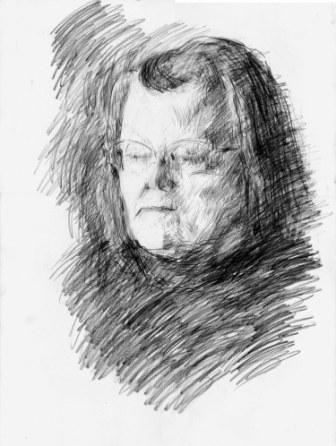I have often thought of the hubris that was required of me when I began teaching creative writing when I had not published much of anything and did not know the cw drill. I hope that I made up in enthusiasm for my lack of experience. A faithful student who took my classes regularly, an older woman, invited me for tea. She had found out that Bill and I loved lubney cheese, and as she was of Lebanese origin, she had made us some. She shyly but proudly showed me her writing space, a closet under the stairs. Over a makeshift desk there was a bookshelf, and I was surprised, because the books were the ones I was always referring to in class. She explained that every time I mentioned one, she would purchase it. Looking at the shelf, I realized what an eccentric collection it was. After she died, her husband had a Lebanese friend make us lubney cheese, and he delivered it to express his appreciation for what I had meant to Madeline. She had published a few things in small magazines; that had made her happy, he said.
Two of these books were Malcolm Lowery’s Under the Volcano, and a study by Sherrill Grace about him. Grace had examined his manuscripts and determined that instead of cutting out, he had added details. His sentences became more and more dense as he revised. That had been a revelation to me when I read it, because I had up until then thought of revision as cutting out superfluous words. I realized that beginning writers didn’t put in enough specific details, and when they tried to, they would make the detail a complete sentence rather than a phrase or clause in the midst of a sentence. It was true too of beginning poets (unless they had the innate poetic ability); there was too much generality, not enough specifics.
In a recent article in the Globe and Mail, Brian Fawcett is quoted as saying that he stopped publishing his poetry in the early 1980’s because no one reads poetry so it is pointless to publish. Yet he continues to write poems. “It’s not about making aesthetic objects; it’s like a pitcher practicing a curve ball.” I think the impulse to write is more than practicing a curve ball; it is an urge to make order out of a messy world and then to show it to someone else to see if the order holds. I read yesterday somewhere in the blogosphere, “A professional writer is an amateur who didn’t quit.” I would add, who didn’t quit because the impulse was so strong that he didn’t need the reward of publishing. Whoever invented the blog had hit upon a deep human yearning; you only have to read the statistics about the number of new blogs that are created every day.
Friday, December 01, 2006
Subscribe to:
Post Comments (Atom)

2 comments:
Oh! Blessed rage for order, pale Ramon,
The maker's rage to order words of the sea,
Words of the fragrant portals, dimly starred,
And of ourselves, and of our origins,
In ghostlier demarcations, keener sounds.
Are you referring to Malcolm Lowry's Vancouver Days, or The Darkness that Murmured?
Post a Comment